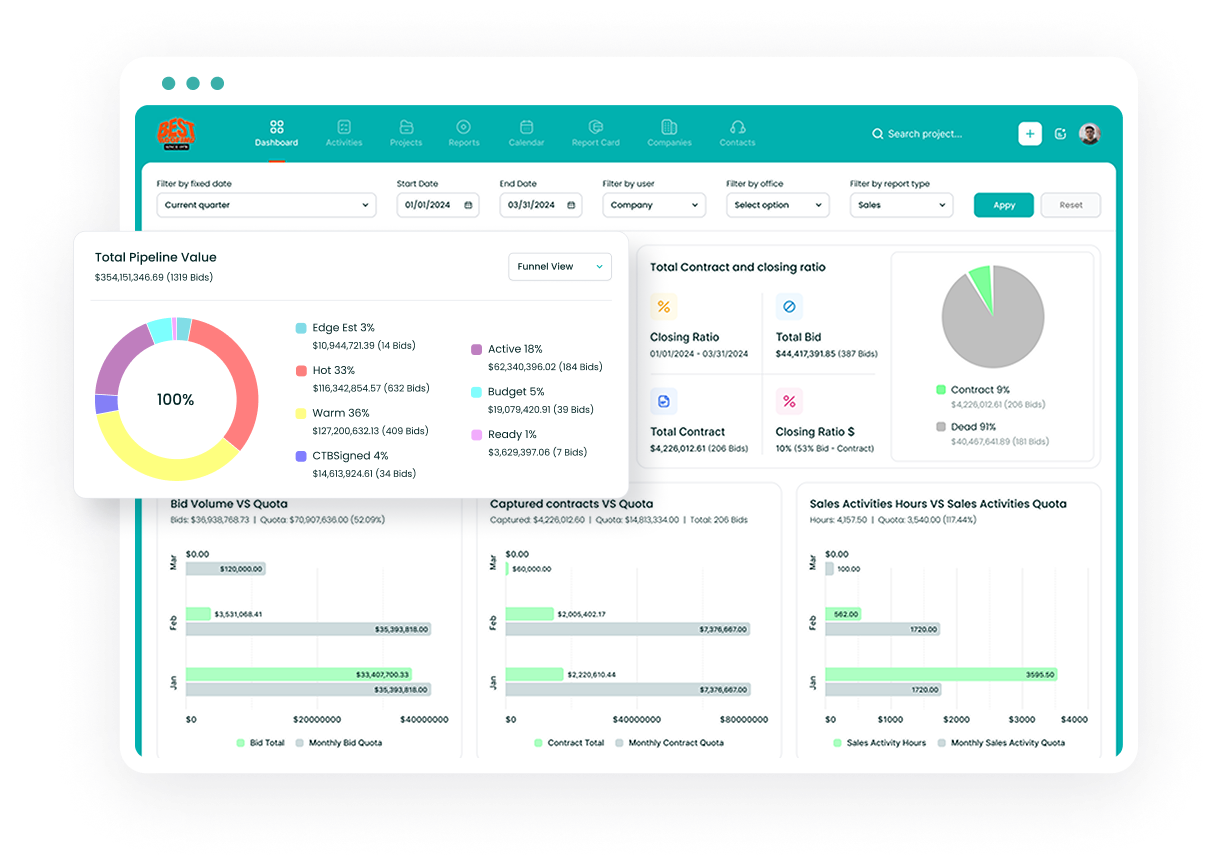How to Change Ball in Court in Procore RFI
Procore’s Request for Information (RFI) tool is designed to streamline communication and accountability on construction projects. One of the key concepts in managing an RFI is the idea of “ball in court” – that is, identifying which party is responsible for taking the next step. In some cases, you may need to change who holds the ball or shift responsibility from one user to another. In this post, we will explore what “ball in court” means in the context of a Procore RFI, who is allowed to change it, and provide step‐by‐step guidelines on how to change the ball in court in Procore RFI.
Understanding Procore RFIs and Ball in Court
Request for Information (RFI) tools in Procore serve as digital communication channels during construction projects. These digital requests help teams clarify project details, address critical questions, and resolve any ambiguities in designs or specifications. Effective communication through RFIs ensures timely responses and minimizes potential project delays that could impact deadlines and budgets.
The term "ball in court" originates from sports terminology, indicating which party currently holds responsibility for action. In Procore's RFI system, this metaphor identifies the specific user responsible for responding to a query. This responsibility typically falls to either the initially assigned RFI Manager or a designated responder with the appropriate expertise. When circumstances change—perhaps the original assignee becomes unavailable or another team member possesses more relevant knowledge—the ball in court needs to be transferred efficiently.
Properly managing the ball in court assignment maintains workflow efficiency and prevents communication bottlenecks. When responsibility rests with the wrong person, projects can experience unnecessary delays, miscommunication, and potential conflicts between team members. The ability to reassign responsibility quickly ensures that questions receive answers from the most qualified individuals, keeping projects moving forward according to schedule.
User Permissions for Changing Ball in Court
Before attempting to change the ball in court assignment, understanding the permission structure in Procore is essential. Different user levels have varying abilities to modify RFI responsibilities, which directly impacts workflow management. Knowing your permission level helps determine your capabilities within the system.
Administrator Level Permissions
Administrator-level users enjoy comprehensive control over the RFI tool. They can create new RFIs, modify virtually all fields, and make critical decisions about responsibility assignments. This includes the ability to change the ball in court at any stage of the RFI process. Administrators can assign themselves or other qualified administrators as RFI Managers and can reassign responsibility whenever necessary without restrictions.
These elevated permissions allow administrators to maintain oversight of the entire RFI process. They can step in when bottlenecks occur, reassign responsibilities during team member absences, and ensure that the right expertise is applied to each information request. This flexibility helps maintain project momentum even when unexpected circumstances arise.
Standard Level with Special Permissions
Standard users typically have more limited capabilities within the RFI tool. They can create RFIs in "Draft" status and add essential details like questions, subjects, and locations. However, once an RFI moves from Draft to Open status, their editing abilities become significantly restricted unless they receive additional permissions.
The granular "Act as RFI Manager" permission extends a standard user's capabilities. When granted this specific permission, standard users can perform many administrator-like functions, including changing the ball in court and modifying key aspects of an RFI. This targeted permission allows organizations to delegate responsibility without granting full administrative access.
Standard users without this special permission face significant limitations in the RFI workflow. They generally cannot change responsibility assignments once an RFI reaches Open status. This restriction helps maintain process integrity but requires careful planning when initially assigning responsibilities.
When to Change the Ball in Court
Several scenarios might necessitate changing the ball in court in a Procore RFI. Understanding these situations helps teams respond appropriately when reassignment becomes necessary.
Team Member Availability Issues
When the originally assigned responder becomes unavailable, reassignment becomes necessary to maintain project momentum. This unavailability might result from scheduled vacations, unexpected absences, or workload constraints that prevent timely responses. Recognizing these situations early allows for proactive reassignment before delays impact the project timeline.
The construction industry often experiences shifting priorities that can suddenly overload certain team members. When this happens, redistributing responsibilities helps balance workloads and ensures that RFIs receive prompt attention. Monitoring response times and team capacity allows project managers to identify potential bottlenecks before they become problematic.
Expertise Matching Requirements
Sometimes after initial assignment, it becomes apparent that another team member possesses more relevant expertise for addressing a particular question. In these cases, changing the ball in court ensures that the most knowledgeable person provides the response. This expertise-based reassignment improves answer quality and reduces the likelihood of follow-up questions.
Technical questions often require specialized knowledge that might not have been apparent when the RFI was first created. As the nature of the question becomes clearer, matching it with the appropriate subject matter expert becomes possible. This targeted assignment strategy maximizes the value of team expertise and produces more comprehensive answers.
Workflow Optimization Needs
Some projects implement standardized workflows where RFI Managers maintain central control rather than distributing responsibility among multiple assignees. In these structured environments, the ball in court might need to be reassigned to the RFI Manager after other team members add their responses. This centralized approach ensures consistent communication and documentation standards.
Organizational policies might dictate specific approval chains for different types of RFIs. When these policies apply, changing the ball in court facilitates the proper progression through required approval steps. Following these established workflows ensures compliance with organizational standards and maintains proper documentation for future reference.
Step-by-Step Guide for Administrators
Changing the ball in court requires different approaches depending on your permission level. Administrator users have the most straightforward process with fewer restrictions.
Accessing the RFI Tool
Begin by logging into your Procore account with your administrator credentials. Navigate to the specific project dashboard containing the RFI you need to modify. The project dashboard displays various tools available for the project, including the dedicated RFI section.
Click on the "RFIs" tool to access the complete list of information requests associated with the project. This centralized view allows you to quickly scan all RFIs and identify the one requiring reassignment. The RFI list typically displays status indicators, making it easy to locate active requests requiring attention.
Use the search functionality if you're working with a large project containing numerous RFIs. You can search by RFI number, subject, or keywords to quickly locate the specific request. Once you've found the relevant RFI, click on the "View" option to open its detailed information page.
Modifying RFI Responsibility
Within the RFI detail view, locate the section displaying the current "Person Responsible" or "RFI Manager" information. This field indicates who currently holds the ball in court and responsibility for the next action. The current assignment provides context for the change you're about to make.
Look for the prominent "Edit" button typically located near the top of the RFI details page. Clicking this button opens the editable version of the RFI with all modifiable fields. Within the "General Information" section, find the RFI Manager field that needs updating.
Click on the dropdown menu in the RFI Manager field to display all eligible users. The system shows only users with appropriate permissions who can accept responsibility for the RFI. Select the new user who should receive the ball in court assignment. Ensure this person has the necessary expertise and availability to address the request promptly.
Finalizing the Change
After selecting the new RFI Manager, review any other fields that might need updating. Check that due dates remain appropriate given the reassignment and that any relevant notes explain the reason for the change. This comprehensive review prevents unintended modifications to other important RFI details.
The following elements should be verified before saving your changes:
- Due date appropriateness
- Status consistency
- Supporting documentation accessibility
- Notification settings
Click the "Save" or "Submit" button to finalize the changes and update the record. Procore automatically generates notification emails to the newly assigned person based on your project's notification settings. These automated alerts ensure the new responsible party receives immediate notification of their assignment.
Guide for Standard Users with Special Access
Standard users with the "Act as RFI Manager" permission follow a slightly different process when changing the ball in court. Understanding these differences helps avoid confusion and ensures successful reassignment.
Confirming Your Permission Level
Before attempting to change any RFI assignments, verify that you have the "Act as RFI Manager" granular permission in your project settings. Without this specific permission, you'll encounter restrictions when trying to modify responsibility assignments. If uncertain about your permission level, contact your project administrator for confirmation.
This special permission grants you expanded capabilities beyond standard user rights. With this permission, you can perform many functions typically reserved for administrators, particularly regarding RFI management. Understanding the scope of your permissions helps you work effectively within the system's constraints.
Permission verification prevents frustration and wasted time attempting actions beyond your authorization level. If you find you lack necessary permissions, request the appropriate access from your project administrator while explaining your specific needs. Many organizations can adjust permissions to accommodate legitimate workflow requirements.
Working with Draft RFIs
Navigate to the RFI tool and locate the Draft RFI requiring modification. Draft status provides greater flexibility for standard users, allowing changes to various fields including the RFI Manager assignment. This draft stage is the optimal time for standard users to make responsibility adjustments.
Click the "Edit" button to open the modifiable version of the RFI. Within the editing interface, locate the "RFI Manager" field (sometimes labeled "Gerente de RFI" depending on language settings). Click the dropdown menu to display all eligible users who can be assigned responsibility.
With your special permission, the dropdown list displays all valid administrator-level users and others with manager designation. Select the appropriate user who should receive the ball in court assignment. Ensure this person has the necessary expertise and availability to address the request effectively.
Submitting and Activating the RFI
After selecting the new RFI Manager, verify all other fields remain correct. Check that the question is clearly stated, supporting documents are attached, and due dates are appropriate. This comprehensive review ensures the RFI contains all necessary information for the newly assigned manager.
When satisfied with all changes, click "Submit for Review" (sometimes labeled "Enviar para revisión" depending on language settings). This action changes the RFI status from Draft to Open and officially transfers responsibility to the newly selected RFI Manager. The ball in court now belongs to this person, who becomes responsible for the next action.
The system automatically generates notifications based on your project's configuration settings. These alerts inform the new RFI Manager of their responsibility and provide direct access to the request details. Following submission, monitor the RFI to ensure the new manager acknowledges receipt and begins addressing the question.
Best Practices for Effective Reassignment
When changing the ball in court, following established best practices ensures smooth transitions and maintains effective project communication. These practices help prevent confusion and keep all stakeholders properly informed.
Communication Protocols
Always verify your project's notification settings before making reassignments. Procore can automatically email the new RFI Manager when responsibility changes, but these notifications depend on proper configuration. Check that notification templates include all necessary information and are directed to the correct recipients.
Maintain clear documentation within the RFI notes explaining why the responsibility change occurred. This transparency creates an audit trail and helps prevent confusion among team members who might otherwise wonder why responsibilities shifted. Simple explanations like "Reassigned due to technical expertise requirements" provide valuable context.
After reassigning the ball in court, personally follow up with the new manager to confirm they received the notification and understand their responsibilities. This direct communication prevents situations where assignments fall through the cracks due to missed notifications or unclear expectations. A quick message ensures everyone remains aligned regarding responsibilities.
Permission and Process Management
The following elements should be verified before initiating any ball in court changes:
- User eligibility - Confirm the new assignee has appropriate permissions
- Notification settings - Ensure automated alerts are properly configured
- Documentation clarity - Verify the RFI contains sufficient information
- Timeline appropriateness - Check that due dates remain realistic
Maintain consistency in RFI numbering and titling even when responsibility changes. Clear documentation standards minimize errors and reduce the need for clarification or rework. This consistency helps all stakeholders quickly identify and reference specific requests regardless of who currently holds responsibility.
Be mindful of how responsibility changes affect the overall project workflow. Reassignments can impact notification timing, follow-up actions, and project scheduling. Coordinate changes with the broader project management team to ensure alignment with overall project objectives and timelines.
Troubleshooting Common Reassignment Issues
Even when following procedures correctly, challenges can arise when changing the ball in court. Understanding common issues and their solutions helps resolve problems quickly and maintain project momentum.
User Selection Problems
Sometimes the user you want to assign doesn't appear in the RFI Manager dropdown list. This typically indicates a permissions issue rather than a system error. The missing user likely lacks either administrator-level permissions or the specific "Act as RFI Manager" permission required for assignment eligibility.
Contact your project administrator to verify and potentially update the user's permissions if appropriate. Explain the specific need for this user to receive RFI responsibility and request the necessary permission adjustments. Most administrators can quickly modify permissions to accommodate legitimate workflow requirements.
If permissions changes aren't possible, identify an alternative user with appropriate permissions who can serve as an intermediary. This person can officially hold the ball in court while coordinating with the subject matter expert who lacks formal permissions. While not ideal, this workaround maintains proper system documentation while ensuring the right expertise addresses the question.
Notification Delivery Issues
After reassigning responsibility, notifications sometimes fail to reach the new ball in court holder. This communication breakdown can result from several factors including email filtering, incorrect contact information, or notification setting misconfiguration. When notifications fail, the newly assigned person remains unaware of their responsibility.
First check your project's notification settings under the RFI configuration menu. Verify that "Ball in Court" notifications are enabled and directed to the correct recipients. Also confirm that email addresses are accurate and that company email filters aren't blocking Procore notifications. Many organizations' spam filters can inadvertently block system-generated messages.
If notification issues persist despite correct settings, contact Procore support for assistance. They can investigate system-level notification problems and recommend solutions. While awaiting resolution, implement manual notification procedures to ensure all responsibility changes are communicated directly to affected team members.
Data Validation Challenges
Incomplete field data can sometimes prevent successful RFI submission after changing the ball in court. Procore enforces data validation rules to ensure RFIs contain all required information. Missing mandatory fields will trigger error messages and prevent successful responsibility reassignment.
Before finalizing any ball in court change, systematically verify all required fields including due dates, subject lines, and any custom fields specific to your organization. The system typically highlights missing information with red indicators or explicit error messages. Address each flagged item before attempting to save changes.
Use Procore's built-in help resources to understand specific field requirements when validation errors occur. Hovering over field labels or clicking help icons often reveals detailed information about expected data formats and requirements. This guidance helps resolve validation issues quickly without requiring external support.
Optimizing Your RFI Management Process
Beyond simply changing the ball in court, implementing broader RFI management strategies improves overall project communication and efficiency. These approaches help minimize the need for frequent reassignments while ensuring information flows smoothly.
Documentation Best Practices
Always use clear, specific language when creating or editing RFIs. Well-crafted requests minimize follow-up questions and reduce misinterpretation risks. Include precise details about the information needed and explain why it matters to the project. This clarity helps the assigned person provide comprehensive answers the first time.
When changing responsibility, add explanatory notes detailing the reason for reassignment. For example, "Reassigning to structural engineer due to specialized foundation knowledge requirements." These notes create valuable context for all stakeholders and maintain transparency throughout the communication process.
Include all relevant supporting documentation when creating or reassigning RFIs. Attach drawings, specifications, photos, or reference documents that provide necessary context. Ensure the newly assigned person can access these attachments by verifying proper linking and permission settings. Complete documentation helps the new responsible party understand the question without requiring additional research.
Timeline and Workflow Management
Set realistic deadlines when creating or reassigning RFIs. Consider the complexity of the question, the current workload of the assigned person, and the impact on the overall project schedule. Unrealistic deadlines create unnecessary pressure and often result in rushed, incomplete responses that require further clarification.
The following factors should influence deadline setting:
- Question complexity
- Research requirements
- Approval chain length
- Project critical path impact
- Team member availability
Document all communication within the RFI system rather than through separate emails or conversations. Use the "Notes" or "Reference" fields to log important details about responsibility changes and follow-up discussions. This comprehensive documentation creates a searchable record that proves invaluable during project reviews or if disputes arise later.
Regularly review your RFI management process to identify improvement opportunities. Gather feedback from team members about response times, assignment clarity, and system usability. If you notice patterns of frequent ball in court changes, investigate underlying causes and implement structural solutions rather than continuing to make case-by-case adjustments.
Leveraging Analytics for Process Improvement
Procore's reporting capabilities provide valuable insights into your RFI management processes. These analytics tools help identify patterns, bottlenecks, and improvement opportunities that might otherwise remain hidden in day-to-day operations.
Tracking RFI Metrics
Monitor key RFI metrics including average response time, reassignment frequency, and resolution rates. These quantitative measures reveal how efficiently your team handles information requests and where process improvements might yield the greatest benefits. Tracking these metrics over time helps identify both positive trends and developing problems.
Compare performance across different project types, team configurations, and RFI categories. This comparative analysis often reveals unexpected patterns—perhaps certain question types consistently require reassignment or specific team members regularly need deadline extensions. These insights help you develop targeted improvements rather than generic process changes.
Share performance metrics with your team to create awareness and accountability. When team members understand how their individual actions contribute to overall project communication effectiveness, they often become more responsive and thorough. Public recognition for exemplary performance further encourages positive behaviors and continuous improvement.
Implementing Process Refinements
Use analytics insights to refine your initial RFI assignment process. If certain question types consistently require reassignment to specific experts, update your initial routing procedures to direct these questions appropriately from the start. This proactive approach reduces unnecessary handoffs and accelerates response times.
Develop standardized templates for common RFI types based on historical patterns. These templates can include suggested assignees, typical documentation requirements, and reasonable timeline expectations. Standardization reduces variation in the RFI process and helps ensure consistent handling regardless of who creates the initial request.
Consider implementing a regular RFI review meeting where team members discuss open requests, upcoming deadlines, and potential bottlenecks. This collaborative approach helps identify reassignment needs early and ensures shared understanding of priorities. Regular reviews also provide opportunities to recognize effective practices and share them across the team.
Maximizing Your Procore RFI Effectiveness Today
Mastering the ball in court functionality in Procore's RFI system significantly improves project communication efficiency. The ability to reassign responsibilities appropriately ensures that questions receive timely, accurate responses from the most qualified team members. This capability becomes particularly valuable as projects grow in complexity and involve larger, more specialized teams.
Remember that changing the ball in court is more than a technical procedure—it's a communication tool that helps maintain project momentum. When used thoughtfully, responsibility reassignment keeps information flowing smoothly even when team availability changes or specialized expertise becomes necessary. The key lies in understanding both the technical steps and the communication implications of each reassignment.
Take time to review your current RFI management practices in light of the strategies discussed here. Consider how you might implement more structured assignment protocols, clearer documentation standards, or more regular process reviews. Small improvements in these areas often yield significant benefits in overall project communication effectiveness and team satisfaction.
The CRM Built For Construction Companies
No more disorganized data. Track your leads, bids, and customers all in one place.
Seamless Integration with:
✅ Foundation ✅ Viewpoint ✅ Sage and more

Request a Live Demo Now
Learn more about how Followup CRM can help your construction company grow.







